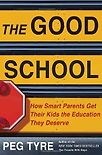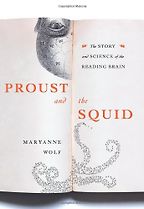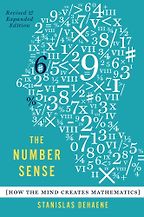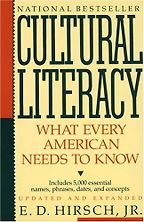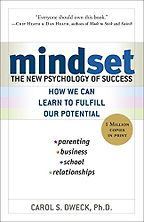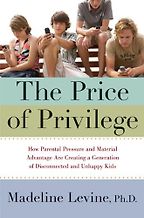Your book, The Good School, educates parents about education. What prompted you to write it?
I’ve been an education journalist for many years and I’ve frequently stumbled on a nugget of knowledge, 10 pages into an academic article, that made me think, “I wish I had known this when I was making decisions about my own children’s schooling.” So I decided to write a book that takes research out of the academic silo and puts it in the hands of the people who need it the most, the parents.
School choice is the basis of a lot of school reform in the United States. Parents are supposed to choose the best school for their child. Money follows the child under state systems so the idea is that good schools thrive and bad schools wither. Improving schools by turning free market forces loose on them was an idea introduced by economist Milton Friedman.
“Schools are frontiers for civic engagement. Engaging in improving the educational system can pay dividends for generations.”
The fatal flaw with that way of thinking is that our educational system is not a rational market. Far be it from me to second-guess Milton Friedman, but we don’t comparison shop for schools the way we do for air conditioners. We know more about air conditioners than we do about education. We don’t know what to look for in schools, let alone how to obtain that information. That’s got to change if we’re going to persist in this idea of unleashing free market forces on schools as a way to improve them.
Your own book is an entertaining introduction to education. The books you’ve chosen could be part of the advanced course. You’ve named five that every parent should read to get smarter about education. Let’s start with Proust and the Squid.
It’s a book about the neurocognition of reading by child development professor Maryanne Wolf. It’s about neuroscience, but it’s also about the history of communication and how we evolved as readers. Parts of it are pretty dense but parts are enormously rewarding. If you read this book, you will never hand your iPhone to your child again when you’re pushing the stroller. You will start talking to them and pointing out colours. If you understand what is happening in their little heads you understand that you can have a major role in their language and reading development.
What does the book teach us about how reading should be taught?
Neurocognitive scientists have built a consensus. They know that the way we naturally learn to read is the way reading was taught in the 1950s – sounding words out, understanding the sounds that letters make and how to blend those sounds through phonics. Phonics allies closely with how our brains learn to read. If your child is not getting phonics, it’s a problem.
About a third of kids learn to read spontaneously, a third need some phonics instruction, and another third need systematic instruction. What third your kid falls in is not necessarily an indication of whether they’re smart or not. It’s just that some kids need a certain kind of instruction and unfortunately a lot of kids do not get it.
Let’s move from reading to arithmetic. Tell us about The Number Sense by mathematician-turned-neuropsychologist Stanislas Dehaene.
Dehaene is the godfather of a new wave of thinking about math instruction. More and more neuroscientists believe we’re born with “gut number sense”, an ancient and unlearned sense of numbers. All kinds of animals have it, pigeons have it, monkeys have it. It’s an evolutionary skill, the ability to quickly size up bunches of bananas and know which one contains the most. Gut number sense is the ability to rapidly estimate numbers and add, subtract or even divide in your head. Gut number sense is the rebar for math. It’s not the ability to execute algorithms, it’s the underlying understanding of basic principles.
What insight does Dehaene offer into how we teach maths?
When schools teach math they tend to ignore that number sense. Dehaene argues that the way math is taught must be better aligned with the way we naturally absorb arithmetic. We know that kids have varying degrees of gut number sense. We know that the kids who have the strongest gut number sense end up doing very well in math. But researchers now are investigating what role gut number sense should play. This wave of research is cresting and it will start coming into the classroom and if you read The Number Sense you will understand what has inspired the new wave of math instruction.
Progressive thinkers are already trying to build on top of the math sense we’re born with, by giving equal emphasis to the concepts behind the algorithm and the execution of the algorithm.
In your book you make the point that maths is not a talent, and being good at maths is a product of hard work.
In countries where kids perform much better on math tests, they don’t see math as a talent, they see it as a muscle that you build. Research bears that out; it shows that practice builds math ability.
Moving beyond reading, writing and arithmetic, tell us about Cultural Literacy. What is it, and who is ED Hirsch?
ED Hirsch is a literature professor who has become best known for his thoughts about cultural literacy and what he means by that is the things we need to know to be educated people.
We’re now getting a bit better at teaching reading in this country. Reading test scores are inching up but then they go flat at third or fourth grade. We’re teaching kids to read but we’re not giving them enough background to understand what they’re sounding out. A student who sees the word Everglades may be able to divide up that compound word into ever and glades but if they don’t know about the swamps in Florida no amount of sounding out will enable them to understand its meaning. They could read the word, but they couldn’t comprehend it.
The rebellion against rote learning went too far and the pendulum has swung too far towards what promoters call “21st-century learning”, which champions “critical thinking” over content. The idea is we really don’t need to know content, we just need to know how to move content around, how to research on the web and store content in the right folder. I’ve realised that Hirsch is right: Content does matter. Higher order thinking must be grounded in content. A good school has a rich content.
I’m reminded of something Harold Bloom said, “Unless you have read and absorbed the best that can be read and absorbed, you will not think clearly or well.” Is that the idea we get from reading Hirsch?
Absolutely. Cultural literacy is critical to the health of our democracy. ED Hirsch reminds us that we shouldn’t let schools teach our children to be mere accountants of information. He reminds us it is as important to know Greek mythology as PowerPoint. Content continues to matter, a lot.
Next you’ve selected a book about laying the groundwork for success. Tell us about Mindset by Stanford psychology professor Carol Dweck.
Before social science popularisers like Malcolm Gladwell got there, there was Carol Dweck – a consummate scientist who gave us real information and important insights into how human character develops. This book can help you learn how to raise motivated and compassionate children and help them become adults with grit, resilience and compassion. She’s not just talking about cultural trends, this book is grounded in rigorous social science. None of these books are particularly accessible, but if you can get through Mindset you will have processed valuable insight into teaching your child to overcome obstacles and setbacks.
I was interested in Dweck’s finding that those who view intelligence as something to develop, rather than inherit, are more successful in their endeavours. How should we change the way we parent and teach based on her research?
The ability to focus and move forward – those soft skills are critical aspects of education. We must praise effort and not accomplishment. We must teach kids to fight for the things that don’t come easily. Grit is a key to success in school and in life.
Finally, The Price of Privilege by psychologist Madeline Levine reminds readers of the perils of overparenting.
Levine worries that we’re creating a generation of overpressured and overprivileged kids who don’t know how to thrive on their own. Her message to parents is: Manipulating our children to succeed so we can feel good about ourselves is selfish, and runs the risk of creating hollow, unhappy and unloving kids who will hate us when they become adults.
How should parents strike the balance between fighting to get their kid the education they deserve, which is what you advocate, and giving kids the space to develop independence?
Every kid deserves an excellent education. Education is the escalator that can take lower-income kids into the middle class. In America we have many substandard middle-class schools and far too many substandard low-income schools. My hope, in writing my book The Good School, was that parents could use it to educate themselves about what schools are doing and to constructively engage with schools to improve education for their children, the children around them and the children that will follow them. Because we know that strong schools create strong communities.
Schools are frontiers for civic engagement. Engaging in improving the educational system can pay dividends for generations. But unless we’re more knowledgeable about it, we’re not going to be very good at it. That’s why I’ve written this book, to give parents the benefit of the best thinking so they can be better-educated consumers and reformers of education.
October 11, 2011. Updated: December 4, 2024
Five Books aims to keep its book recommendations and interviews up to date. If you are the interviewee and would like to update your choice of books (or even just what you say about them) please email us at [email protected]
Support Five Books
Five Books interviews are expensive to produce. If you've enjoyed this interview, please support us by donating a small amount.
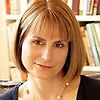
Peg Tyre
Peg Tyre is a writer who has spent two decades in journalism, including at Newsweek and The New York Times. She was part of a group of reporters who won a Pulitzer prize and she was twice nominated for a National Magazine Award. A graduate of Brown University, her bestselling first book The Trouble with Boys won the Books for a Better Life award in 2009. She teaches a course on “covering education” at the Columbia Graduate School of Journalism. Her latest book, The Good School, is a guide for parents on how to get the best education for their children

Peg Tyre
Peg Tyre is a writer who has spent two decades in journalism, including at Newsweek and The New York Times. She was part of a group of reporters who won a Pulitzer prize and she was twice nominated for a National Magazine Award. A graduate of Brown University, her bestselling first book The Trouble with Boys won the Books for a Better Life award in 2009. She teaches a course on “covering education” at the Columbia Graduate School of Journalism. Her latest book, The Good School, is a guide for parents on how to get the best education for their children

